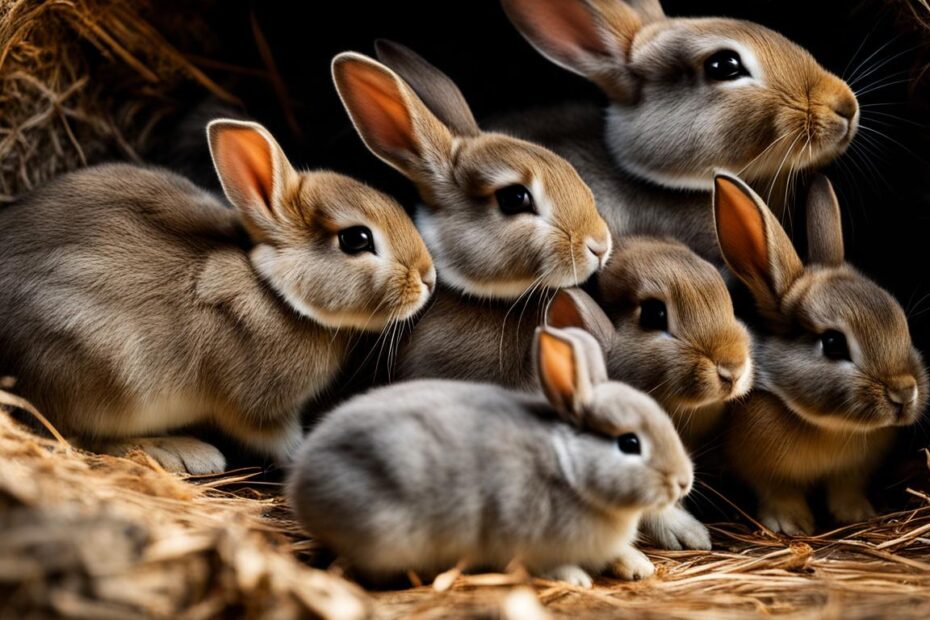Have you ever wondered if rabbits would eat their own babies? It may surprise you to learn that while it is not a common behavior, rabbits can sometimes eat their young. This can occur for various reasons, such as anxiety, dietary deficiencies, or excessive territoriality. In this article, we will explore why rabbits may eat their babies and what you can do to prevent this behavior.
Key Takeaways:
- While rare, rabbits can eat their own young due to factors such as anxiety, dietary deficiencies, or territorial behavior.
- Stillborn babies, confusion during the consumption of afterbirth, and panic can contribute to a rabbit eating its babies.
- It is generally best to allow the mother rabbit to care for her babies, but if there are signs of aggression or neglect, it may be necessary to remove the kits for their safety.
- To prevent a rabbit from eating her babies, provide a calm environment, increase protein in her diet, and monitor her closely after giving birth.
- Male rabbits do not typically eat their babies, but it’s still recommended to separate them from the mother and the litter.
Will Rabbits Eat Their Babies
Why Do Rabbits Eat Their Babies?
Rabbits eating their babies is a rare behavior, but when it does occur, there are several reasons behind it. Understanding these reasons can shed light on why some rabbits exhibit this behavior and what can be done to prevent it.
One of the main reasons why rabbits eat their babies is stillborn births. If a rabbit gives birth to stillborn babies, she may consume them as a way to clean up the nest and remove any potential disease or threat. Additionally, confusion during the consumption of afterbirth can also trigger a rabbit to eat her young. This confusion can arise if the afterbirth gets mixed up with the live babies, leading the mother to accidentally consume them.will rabbits eat their babies
Another factor that may cause a rabbit to eat her babies is panic. If the mother rabbit feels threatened by predators or experiences other sources of stress, she may resort to eating her young as a survival instinct. In some cases, lack of dietary protein can also contribute to this behavior. If the mother rabbit’s diet is deficient in protein, she may see her babies as a source of nourishment.do rabbits eat their babies
Lastly, territorial behavior can also play a role in a rabbit eating her babies. If the mother rabbit becomes excessively territorial, she may view her young as competitors for resources and eliminate them to ensure the survival of stronger offspring.
Table: Reasons for Rabbits Eating Their Babies
| Reason | Description |
|---|---|
| Stillborn births | Rabbits may eat their babies if they are stillborn as a way to clean up the nest and remove potential threats. |
| Confusion during afterbirth consumption | If the afterbirth gets mixed up with the live babies, the mother rabbit may accidentally consume them. |
| Panic caused by stress or predators | If the mother rabbit feels threatened or stressed, she may eat her young as a survival instinct. |
| Lack of dietary protein | If the mother rabbit’s diet is deficient in protein, she may see her babies as a source of nourishment. |
| Territorial behavior | If the mother rabbit becomes excessively territorial, she may view her young as competitors and eliminate them. |
Understanding the reasons behind a rabbit eating her babies can help rabbit owners identify potential triggers and take preventive measures. Providing a calm and secure environment for the mother rabbit, ensuring she has a balanced diet with sufficient protein, and minimizing potential sources of stress can help reduce the likelihood of cannibalistic behavior. Additionally, close monitoring of the mother rabbit’s behavior after giving birth and intervening if necessary can further ensure the safety of the baby rabbits.why do rabbits eat their babies
It’s important to note that not all rabbits exhibit this behavior, and many successfully raise and care for their young without any issues. However, being aware of the reasons behind a rabbit eating her babies can help rabbit owners be proactive in creating a conducive environment for a successful and healthy litter.
Should I Remove My Rabbit’s Babies?
When it comes to deciding whether or not to remove a rabbit’s babies, there are a few factors to consider. In general, it is best to allow the mother rabbit to care for her babies, as she possesses the natural instincts and skills necessary for their survival. However, there may be instances where intervention is necessary for the well-being of the kits.
If you observe early warning signs that the mother rabbit may eat her babies, such as aggressive behavior towards them or neglecting their care, it may be necessary to remove the kits. This is especially important if you notice that the mother has a history of cannibalism or if she seems excessively stressed. Removing the babies will ensure their safety and give them a better chance of survival.can rabbits eat their babies
Additionally, if the mother rabbit is inexperienced or unable to properly care for her babies due to illness or other factors, it may be necessary to step in and provide the necessary care yourself. In such cases, consult with a veterinarian or a rabbit expert to ensure that you are providing the right care and nutrition for the young rabbits.
| When to consider removing the babies: | When to allow the mother to care for the babies: |
|---|---|
| If the mother exhibits aggressive behavior towards the kits | If the mother is attentive and caring towards her babies |
| If the mother has a history of cannibalism | If the mother has successfully raised previous litters |
| If the mother seems excessively stressed or neglects her babies | If the mother appears calm and attentive to her young |
Ultimately, the decision to remove a rabbit’s babies should be based on the assessment of the situation and the well-being of the kits. It is important to prioritize their safety and ensure that they have the best chance of thriving in a nurturing environment. do mother rabbits eat their babies
How Can I Prevent My Rabbit from Eating Her Babies?
Rabbits occasionally exhibit the behavior of consuming their own young, but there are measures you can take to minimize the risk of rabbit cannibalism. By understanding the reasons behind this behavior and implementing preventive strategies, you can ensure the safety and well-being of both the mother rabbit and her babies.
1. Provide a calm and secure environment: Creating a peaceful and stress-free environment for the mother rabbit is crucial. Ensure that the cage or hutch is located in a quiet area, away from potential disturbances. A calm environment can help reduce anxiety and minimize the chances of cannibalistic behavior.
2. Increase the protein content in her diet: A lack of dietary protein can contribute to a rabbit feeling the need to consume her young. Make sure to provide the mother rabbit with a balanced diet that includes sufficient protein sources. Consult with a veterinarian to determine the appropriate diet for your rabbit.
3. Monitor her closely after giving birth: Keep a close eye on the mother rabbit and the babies during the postpartum period. Look for any signs of aggression or neglect towards the newborns. If you notice any concerning behavior, it may be necessary to intervene and remove the babies to ensure their safety.
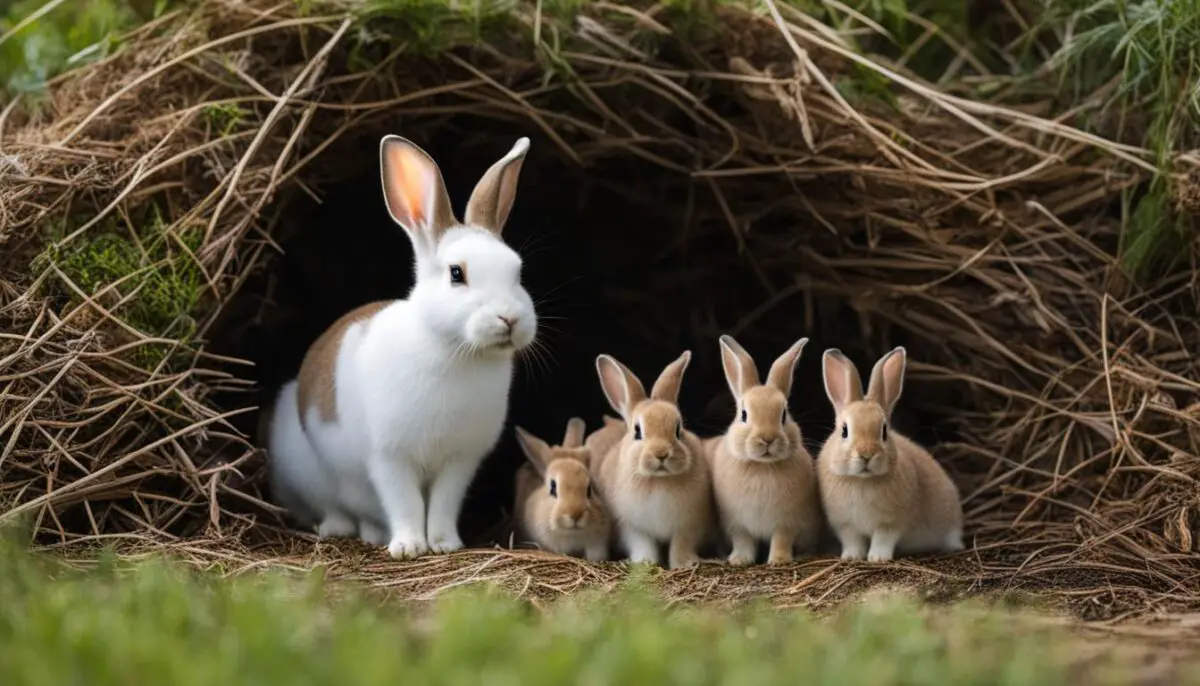
Additional Tips to Stop Rabbit Cannibalism:
- Shower the mother rabbit with affection, ensuring she feels loved and secure.
- Minimize any potential causes of stress in the environment, such as loud noises or sudden disruptions.
- Consider the introduction of a companion rabbit to alleviate any potential loneliness or jealousy.
- If needed, provide separate nesting areas to give the mother rabbit a sense of privacy and territoriality.
In conclusion, preventing rabbits from eating their babies requires a combination of creating a calm environment, ensuring a proper diet, and closely monitoring the mother rabbit’s behavior. By taking these proactive steps, you can significantly reduce the risk of rabbit cannibalism and promote the healthy growth of the offspring.rabbits eating their young
Will a Male Rabbit Eat His Babies?
While it is rare for male rabbits to eat their babies, it is still recommended to separate them from the mother and the litter. Male rabbits do not have paternal instincts and may see the babies as rivals. Additionally, they are unable to provide the necessary care for the young rabbits.why do mother rabbits eat their babies
Male rabbit cannibalism is not a common behavior, but it can occur if the male rabbit feels threatened or if resources are scarce. In the wild, male rabbits may kill and eat the offspring of competing males to eliminate competition for mates and resources. This behavior is instinctual and serves to increase the male’s chances of passing on his own genes.
When raising rabbits in captivity, it is important to prevent any potential aggression from the male towards the babies. By separating the male from the mother and the offspring, you can ensure the safety and well-being of the young rabbits. This also gives the mother rabbit the space and freedom to care for her babies without any disturbances or potential harm.
It is worth noting that not all male rabbits exhibit aggressive behavior towards their offspring. Some males may show curiosity or indifference towards the babies. However, to avoid any risks and ensure the survival of the young rabbits, it is generally recommended to separate the male from the rest of the family.
Table: Male Rabbit Behavior towards Babies
| Behavior | Description |
|---|---|
| Aggression | Male rabbit displays aggressive behavior towards the babies, posing a threat to their safety. |
| Indifference | Male rabbit shows little to no interest in the babies, neither harming nor caring for them. |
| Curiosity | Male rabbit displays curiosity towards the babies but does not exhibit any aggressive or harmful behavior. |
Do Rabbits Eat Their Babies if You Touch Them?
There is a common myth that suggests that rabbits will eat their babies if humans touch them. However, this belief is not supported by scientific evidence. Rabbits are generally indifferent to human scent on their young and touching the babies will not trigger cannibalistic behavior in the mother. It is important to note that rabbits have a strong maternal instinct and typically provide attentive care to their offspring.can mother rabbits eat their babies
While it is safe to handle baby rabbits and interact with them, it is crucial to be mindful of the mother rabbit’s behavior. Avoid provoking aggression or causing harm to the babies by handling them gently and with care. If the mother displays signs of stress or aggression, it may be best to limit touching the babies to avoid any potential harm.
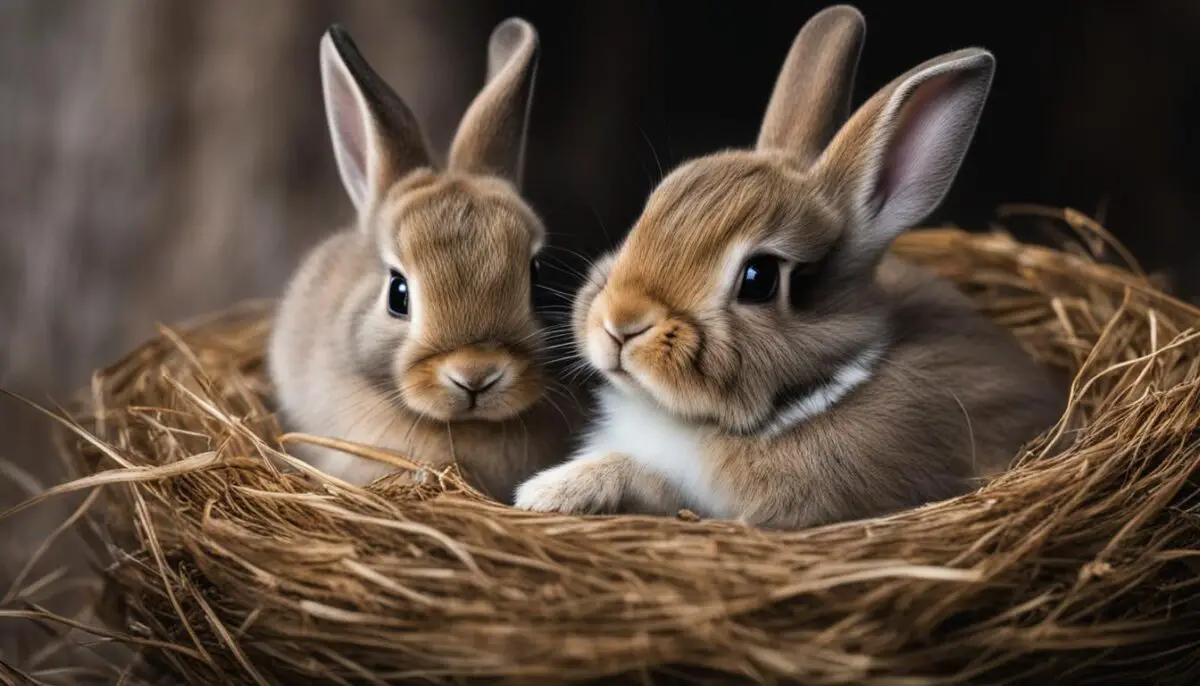
Contrary to popular belief, touching baby rabbits does not cause the mother to eat them. Rabbits are generally indifferent to human scent on their young. However, it is important to be mindful of the mother rabbit’s behavior and not provoke aggression or harm to the babies.why rabbits eat their newborns
Why Do My Baby Rabbits Keep Disappearing?
If you’ve noticed that your baby rabbits are mysteriously disappearing from their nest, there could be a couple of reasons for this unfortunate occurrence. The first possibility is that the babies may have wandered off or fallen out of the nesting box. It’s not uncommon for curious young rabbits to explore their surroundings, and if they venture too far, they can become separated from their siblings and the safety of the nest.
Another reason for the disappearance of baby rabbits could be predators. Small animals like rats can easily access rabbit hutches and pose a threat to the vulnerable young rabbits. These predators are opportunistic and will seize the chance to prey on the defenseless babies if given the opportunity.
To prevent your baby rabbits from disappearing, it’s important to take measures to ensure their safety. Providing a secure and well-maintained nesting box can reduce the chances of the babies wandering off. Additionally, reinforcing the hutch to keep out predators and regularly checking for any signs of intrusion can help protect the young rabbits.
| Predator | Description |
|---|---|
| Rats | Small and nimble rodents that can easily access rabbit hutches and prey on baby rabbits. |
| Wild cats | Feral or stray cats that see baby rabbits as potential prey and can infiltrate the hutch. |
| Snakes | Certain species of snakes can slither into the hutch and consume the young rabbits. |
By taking precautions to prevent babies from wandering off and protect them from predators, you can increase the chances of their survival and ensure their well-being in the nest. Keep a close eye on the nesting box and the surroundings to address any potential risks promptly. Remember, the safety of the baby rabbits is crucial for their growth and development.
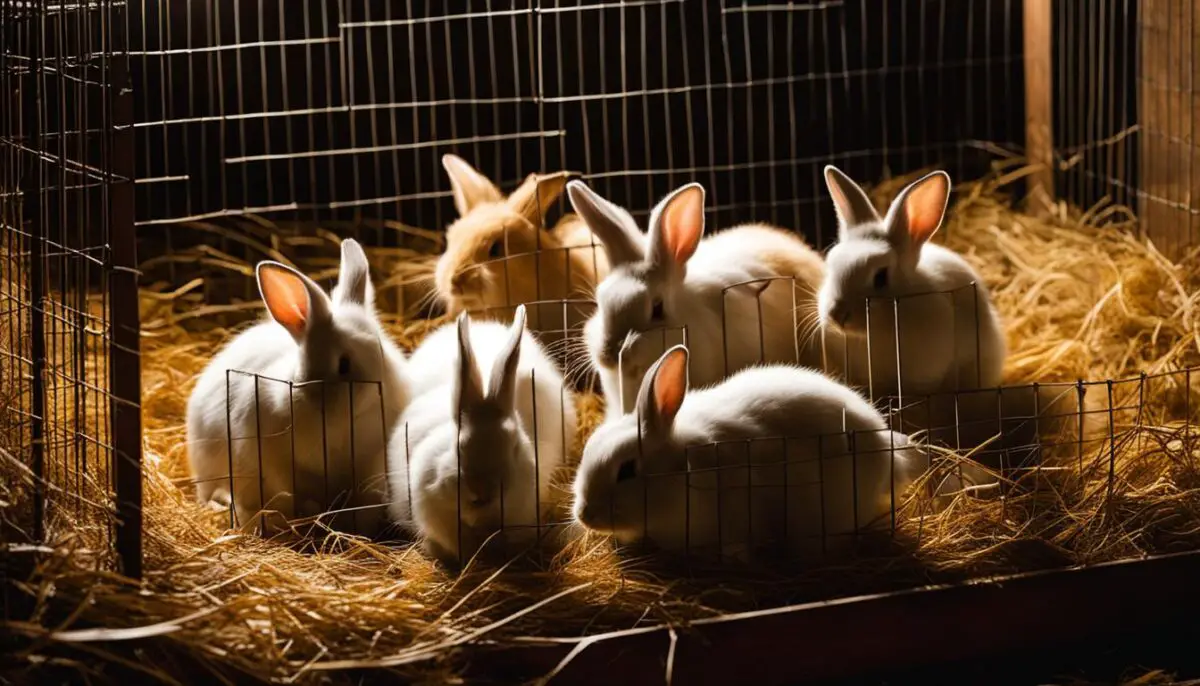
Reasons Rabbits Eat Their Young
Rabbits may exhibit the behavior of eating their young due to various factors. Understanding these reasons can help rabbit owners prevent and address this behavior effectively. Here are some common reasons why rabbits eat their young:
- Stillborn births: If a rabbit gives birth to stillborn babies, she may consume them as part of her natural instinct to remove any potential sources of disease or harm from the nest.
- Confusion during the consumption of afterbirth: When a rabbit gives birth, the afterbirth, which is the placenta and other membranes, is expelled. Sometimes, the mother rabbit may mistakenly consume a live baby while trying to consume the afterbirth, leading to cannibalism.
- Panic caused by external stressors: Rabbits can be highly sensitive and easily stressed. External stressors such as predators, loud noises, or sudden movements can trigger a panic response, causing the mother rabbit to eat her young as a way to protect them or herself.
- Lack of dietary protein: A diet lacking in sufficient protein can lead to nutritional deficiencies in rabbits. This deficiency can affect the mother rabbit’s ability to produce enough milk and nourish her young, prompting her to consume them for survival.
- Territorial behavior: Rabbits are inherently territorial animals. If a mother rabbit feels her nest is being threatened or invaded, she may resort to cannibalism as a way to eliminate the perceived threat and ensure the survival of her remaining young.
Understanding these reasons can help rabbit owners take appropriate measures to prevent cannibalism and create a conducive environment for their rabbits to raise their young successfully. By addressing factors such as providing a balanced diet, reducing stress, and ensuring a secure nesting area, rabbit owners can greatly reduce the likelihood of cannibalistic behavior.
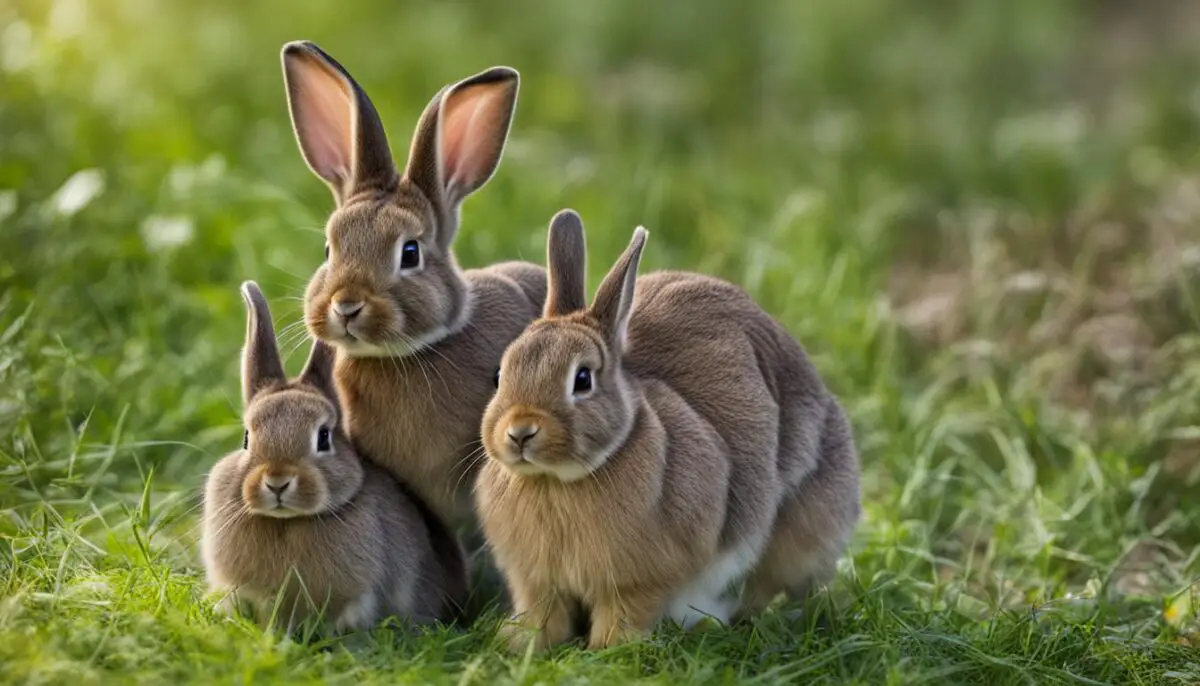
How to Prevent and Stop Rabbit Mothers from Eating Their Babies
Rabbits can occasionally exhibit cannibalistic behavior and eat their own young. However, by taking preventive measures and closely monitoring the mother rabbit, it is possible to minimize the risk of rabbit cannibalism and ensure the safety of the babies. Here are some steps you can take to prevent and stop rabbit mothers from eating their babies:
Create a Calm and Stress-Free Environment
Rabbits are sensitive animals, and stress can trigger aggressive behavior. Provide a quiet and secure environment for the mother rabbit and her babies. Ensure that the hutch or cage is located away from loud noises, excessive human or animal activity, and potential sources of stress.
Monitor the Mother Rabbit Closely
After the mother rabbit gives birth, keep a close eye on her behavior. Look out for signs of aggression, neglect, or any unusual behavior that may indicate she is considering eating her babies. If you notice any warning signs, it may be necessary to intervene to protect the young kits.
Intervene if Necessary
If you suspect that the mother rabbit may harm her babies, it may be necessary to remove the kits for their safety. Ensure that you handle the babies with clean hands and a gentle touch to avoid unnecessary stress. Provide an alternative cozy nest for the babies, such as a small box lined with soft bedding, and monitor their progress closely.
| Preventing Rabbit Cannibalism | Stopping Rabbit Infanticide | Preventing Rabbit Maternal Aggression |
|---|---|---|
| Provide a calm and stress-free environment | Create a calm and secure environment | Monitor the mother rabbit closely |
| Monitor the mother rabbit closely | Intervene if necessary | Intervene if necessary |
| Intervene if necessary |
By following these preventive measures and actively observing the behavior of the mother rabbit, you can increase the chances of the babies surviving and thriving. It is important to provide a nurturing and safe environment for these delicate creatures, ensuring their well-being and healthy development.
Do Male Rabbits Kill Babies?
While male rabbits are not known to kill babies, they may sometimes exhibit aggressive behavior towards them. This aggression is typically driven by territorial instincts and a perceived threat to their own survival. Male rabbits are not biologically equipped to provide care for the young and may view them as rivals for resources. As a result, it is crucial to separate male rabbits from the mother and her babies to ensure their safety.
“While male rabbits do not typically kill their babies, they may display territorial aggression towards the young. This behavior stems from their instinctual drive to protect their own territory and resources. Separating the males helps to prevent any harm coming to the vulnerable babies and ensures their well-being.”
Removing the male rabbit from the presence of the mother and her babies reduces the risk of aggression and potential harm. It also allows the mother to focus solely on caring for her offspring without any external disturbance. Male rabbits do not possess the instincts or capabilities to provide the necessary care and protection for the young, so it is essential to prioritize the safety and well-being of the babies by keeping them separate.
| Male Rabbit Behavior | Recommendation |
|---|---|
| Exhibiting aggressive behavior towards babies | Separate the male rabbit from the mother and babies |
| Showing territorial instincts | Ensure a safe and separate space for the mother and babies |
| Lacking the ability to provide care for the young | Focus on the mother’s ability to care for her offspring |
By understanding the natural behaviors of male rabbits and taking proactive measures to prevent aggression, it is possible to create a safe and nurturing environment for the mother and her babies. Ensuring their separation promotes the well-being of the young rabbits and allows the mother to fulfill her maternal instincts without any interference or potential harm from the male.
Conclusion
Rabbits eating their babies is a rare behavior, usually triggered by factors such as stress, lack of nutrition, confusion, or territoriality. While it may be distressing to witness, understanding the reasons behind this behavior can help prevent it from happening. By taking preventive measures and closely monitoring the rabbit’s behavior, it is possible to minimize the risk of cannibalism.
Ensuring a healthy and secure environment for the mother and her babies is crucial for their well-being. Providing a calm and stress-free space, along with a well-balanced diet rich in protein, can help alleviate potential triggers for cannibalism. Additionally, closely observing the rabbit after giving birth and intervening if necessary can help protect the safety of the young rabbits.
Remember that rabbits eating their babies is not a common occurrence, and most rabbit mothers are capable of caring for their offspring without any issues. However, it is always important to be proactive in creating a supportive environment for both the mother and her babies to ensure their well-being and the successful rearing of the young.
FAQ
Will Rabbits Eat Their Babies?
Rabbits can sometimes eat their own young, but it is not a common behavior. Factors such as stillborn babies, confusion during the consumption of afterbirth, panic, dietary deficiencies, and territorial behavior can contribute to a rabbit eating its babies.
Why Do Rabbits Eat Their Babies?
There are several reasons why a rabbit may eat its babies. It could be due to stillborn births, confusion during the consumption of afterbirth, panic caused by predators or other sources of stress, lack of dietary protein, or territorial behavior.
Should I Remove My Rabbit’s Babies?
It is generally best to allow the mother rabbit to care for her babies, as they require maternal care for their survival. However, if there are early warning signs that the mother may eat her babies, such as aggressive behavior or neglect, it may be necessary to remove the kits to ensure their safety.
How Can I Prevent My Rabbit from Eating Her Babies?
To minimize the risk of a rabbit eating her young, there are several preventative measures that can be taken. These include providing a calm and secure environment for the rabbit, increasing the protein content in her diet, monitoring her closely after giving birth, and showering her with affection to reduce potential jealousy or territorial instincts.
Will a Male Rabbit Eat His Babies?
While it is rare for male rabbits to eat their babies, it is still recommended to separate them from the mother and the litter. Male rabbits do not have paternal instincts and may see the babies as rivals. Additionally, they are unable to provide the necessary care for the young rabbits.
Do Rabbits Eat Their Babies if You Touch Them?
Contrary to popular myth, touching baby rabbits does not cause the mother to eat them. Rabbits are generally indifferent to human scent on their young. However, it is important to be mindful of the mother rabbit’s behavior and not provoke aggression or harm to the babies.
Why Do My Baby Rabbits Keep Disappearing?
If baby rabbits are disappearing from the nest, it could be due to two main reasons. The babies may have wandered off or fallen out of the nesting box, requiring a search of the surrounding area. Alternatively, predators such as rats may have gained access to the hutch and preyed on the young rabbits.
Reasons Rabbits Eat Their Young
Rabbits may eat their young for various reasons. These include stillborn births, confusion during the consumption of afterbirth, panic caused by external stressors, lack of dietary protein, territorial behavior, and a focus on raising the strongest young for survival.
How to Prevent and Stop Rabbit Mothers from Eating Their Babies
There are several steps that can be taken to prevent and stop rabbit mothers from eating their babies. These include ensuring the rabbit has adequate nutrition, providing a calm and stress-free environment, closely monitoring the mother after giving birth, and intervening if necessary to remove the babies for their safety.
Do Male Rabbits Kill Babies?
While male rabbits are not known to kill babies, they may sometimes exhibit aggressive behavior towards them. This is typically due to territorial instincts and a perceived threat to their own survival. It is important to separate male rabbits from the mother and the babies to ensure their safety.


